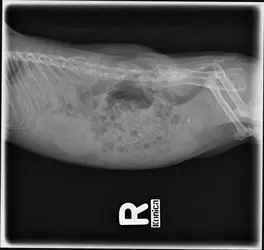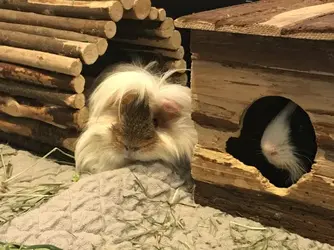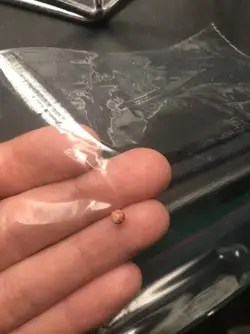cfarrell25
Junior Guinea Pig
- Joined
- Oct 23, 2017
- Messages
- 26
- Reaction score
- 18
- Points
- 155
Hello - first time posting here (although I've been an avid reader!)
Last week, 1.5 year old boar Mose was peeing some blood (although no signs of pain) and was diagnosed with a bladder stone. I was quite surprised, since we feed them red leaf, green leaf lettuce, with the occasional red pepper, cucumber, timothy hay, and sparse amount of Sherwood pellets. I had never noticed any sludgy urine. We lost a piggy last year due to stones so we've been pretty paranoid about what we feed them.
Now comes the time to decide what we will do, to operate or not. My main concern with the operation is that he'll suffer, and that the stones will reoccur. I'm sure I could make some tweaks to deter reoccurrence (i.e. no pellets, maybe more exercise, maybe be more anal about the cleanliness of the cage) although I'm not sure that'll be enough as I think we've been pretty good at taking the right steps to prevent them to start with. Is he one of those piggies that will be producing them for the rest of his life? I definitely don't want to put him through multiple surgeries as I don't think that's fair to him. I know that the occurrence of stones is a mystery for the most part, although I'm not sure what could have caused them to start with and what I could change that could keep them at bay...
On the other hand, there's also the slight chance that he'll maybe pass it? Not sure if others can attest to boars passing stones of the size shown below (taken a few days ago).
Right now he is comfortable, on pain medication and Baytril. Although he has lost quite a bit of weight and eats sparingly (probably due to Baytril) so I syringe water, probiotics (poop soup), and critical care. We have an appointment tomorrow with our vet for the operation but I am having second thoughts that I am making the wrong decision and it might cost him his quality of life.
Last week, 1.5 year old boar Mose was peeing some blood (although no signs of pain) and was diagnosed with a bladder stone. I was quite surprised, since we feed them red leaf, green leaf lettuce, with the occasional red pepper, cucumber, timothy hay, and sparse amount of Sherwood pellets. I had never noticed any sludgy urine. We lost a piggy last year due to stones so we've been pretty paranoid about what we feed them.
Now comes the time to decide what we will do, to operate or not. My main concern with the operation is that he'll suffer, and that the stones will reoccur. I'm sure I could make some tweaks to deter reoccurrence (i.e. no pellets, maybe more exercise, maybe be more anal about the cleanliness of the cage) although I'm not sure that'll be enough as I think we've been pretty good at taking the right steps to prevent them to start with. Is he one of those piggies that will be producing them for the rest of his life? I definitely don't want to put him through multiple surgeries as I don't think that's fair to him. I know that the occurrence of stones is a mystery for the most part, although I'm not sure what could have caused them to start with and what I could change that could keep them at bay...
On the other hand, there's also the slight chance that he'll maybe pass it? Not sure if others can attest to boars passing stones of the size shown below (taken a few days ago).
Right now he is comfortable, on pain medication and Baytril. Although he has lost quite a bit of weight and eats sparingly (probably due to Baytril) so I syringe water, probiotics (poop soup), and critical care. We have an appointment tomorrow with our vet for the operation but I am having second thoughts that I am making the wrong decision and it might cost him his quality of life.


